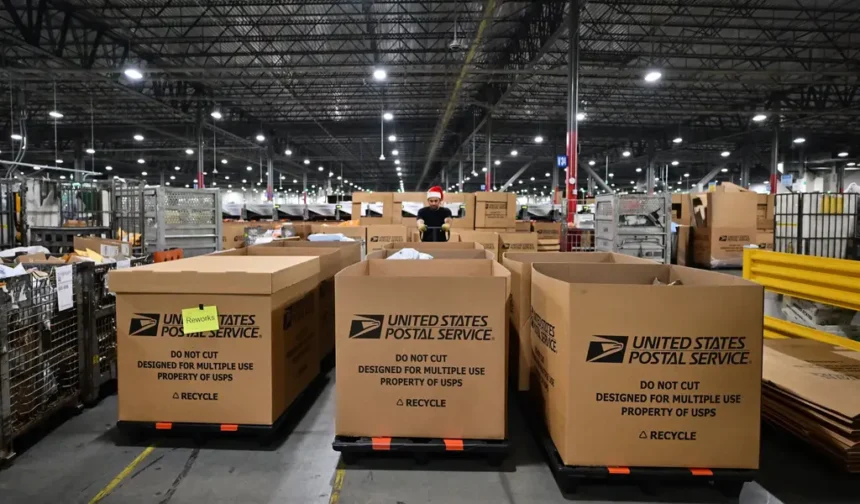Following a brief suspension due to Donald Trump‘s modifications to import tax regulations, the United States Postal Service (USPS) has resumed accepting shipments from mainland China and Hong Kong.
USPS stated that it was collaborating with US Customs and Border Protection to minimize the disruption of package deliveries in response to the US president’s announcement of trade measures, which included increased tariffs on Chinese products.
The United States also terminated a policy that permitted the sending of small parcels valued at $800 (£641) or less to the United States without the payment of taxes or fees.
Chinese retailers, including online titans Shein and Temu, have utilized the exemption to ship low-value packages to the United States. They have also capitalized on comparable regulations in the United Kingdom and the European Union (EU) to reach millions of customers.
In recent years, scrutiny has increased due to the significant increase in the number of parcels being delivered under the loophole. Even though all retailers utilize the exemption, those specialising in rapid fashion and inexpensive products have experienced a significant increase in sales.
It has raised concerns that domestic retailers are undermined and governments miss out on potential tax revenue.
Nick Stowe, the chief executive of Monsoon Accessorize, told the BBC’s Today program that he favoured the adjustments in the United States.
“It has long been a complaint of UK retailers, European retailers, and US retailers that Shein are exploiting this loophole, not paying customs duty, and they have built a business at an industrial scale,” he said.
EU Announces Stricter Measures on Low-Value Shipments from China
On Tuesday, the United States implemented a policy change prohibiting the shipment of low-value products without paying taxes under the “de minimis” exemption.
The postal service suspended parcels from China overnight but were reactivated on Wednesday. The USPS, Customs, and Border Protection are collaborating to establish an efficient collection mechanism for the new China tariffs to minimize the impact on package delivery.
Trump’s announcement of a 10% tariff on all products imported to the United States from China does not affect letters.

DHL, the global leader in shipping and courier services, stated that it was “collaborating with our customers, suppliers, and other stakeholders to effectively manage these changes” to prevent disruptions to supply chains and “minimize the adverse impact on US importers and consumers.”
In the interim, the European Union, investigating measures comparable to those of the United States, declared that Temu and Shein would be held accountable for selling hazardous and harmful products on their platforms.
Critics contend that the EU’s policy of exempting retailers from paying taxes on shipments valued at less than €150 (£124) grants them an unfair advantage.
The European Commission reported that the EU imported 4.6 billion low-value items worth less than €22 last year, with 91% originating from China. This figure is twice as high as in 2023.
The European Union declared it would intensify customs inspections of products shipped directly by ecommerce retailers.
It also stated that it would facilitate a joint investigation into Shein by the Consumer Protection Cooperation (CPC) Network in response to allegations that the company violates EU consumer protection regulations.
Shein stated that it would collaborate with the EU and the CPC agencies to ensure consumers can shop online confidently.
“We want to see a competitive e-commerce sector that keeps consumers safe, offers convenient products, and is respectful of the environment,” said EU technology chief Henna Virkkunen.
China Responds to US Tariffs with Countermeasures
According to a 2023 report by the US Congress, China was the source of nearly half of all shipments that entered the United States under de minimis exemptions.
Officials have noted that the substantial volume of parcels entering the country through this exemption has made inspecting them for potential illicit items more challenging.
Before Trump’s inauguration, changes to the tax exemption in the United States under President Joe Biden were already underway. However, Trump has taken it a step further by imposing tariffs on all Chinese products imported into the United States, including toys and fashion items.
China responded by announcing that it would retaliate with its tariffs and include PVH, the US company that owns designer brands Calvin Klein and Tommy Hilfiger, on its “unreliable entity” list in response to alleged “discriminatory measures against Chinese enterprises.”
Trump had been anticipated to engage in discussions with his Chinese counterpart, Xi Jinping, soon; however, on Tuesday, he declared that he was not in a hurry to do so.
Certain retailers in the United Kingdom have urged the government to address the issue of low-value products being imported into the country without paying taxes.
Julian Dunkerton, the CEO of apparel chain Superdry, stated, “The regulations were not intended for a company that sends individual parcels and has a billion-pound turnover in the UK without paying any tax.”
Import duties are not imposed on shipments valued at less than £135 delivered directly to UK consumers; however, firms that import larger quantities are subject to these fees.
Mr Stowe of Monsoon Accessorize believed that shipments should not be halted but that ecommerce companies should contribute their “fare share.”
The BBC has contacted Shein, Temu, and the United Kingdom government for comment.

Salman Ahmad is known for his significant contributions to esteemed publications like the Times of India and the Express Tribune. Salman has carved a niche as a freelance journalist, combining thorough research with engaging reporting.














